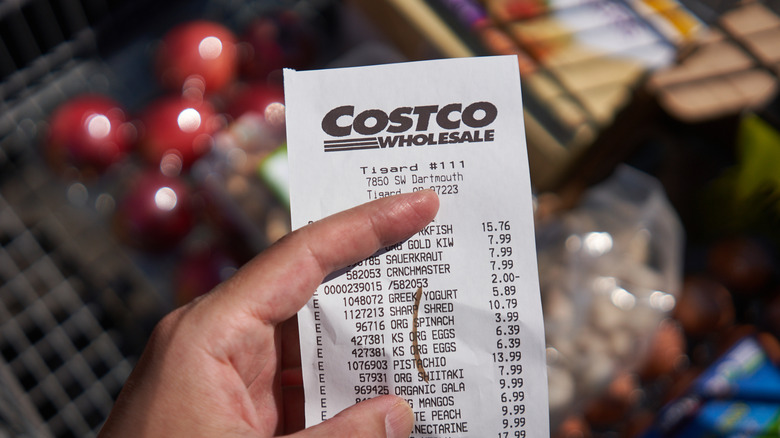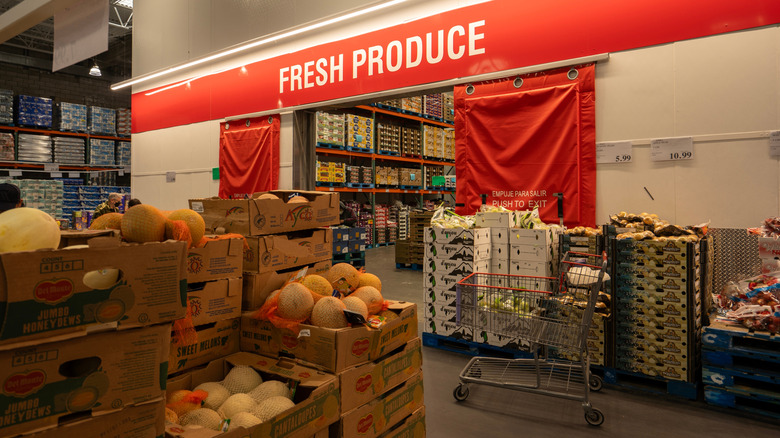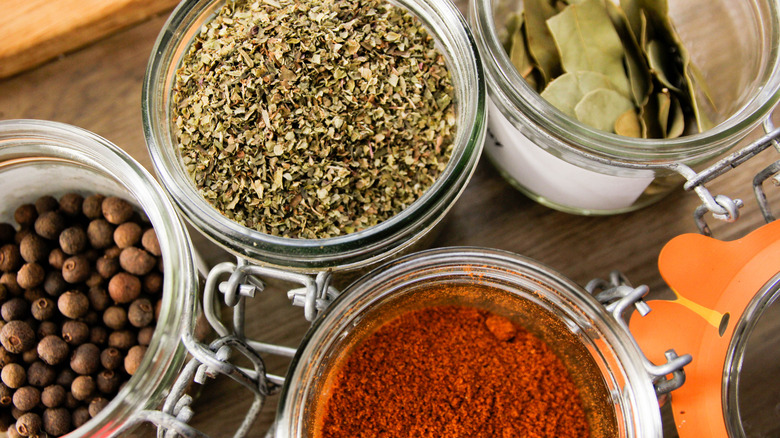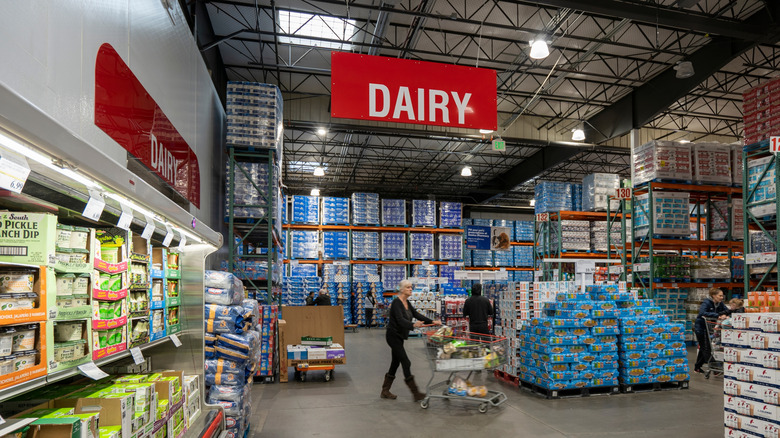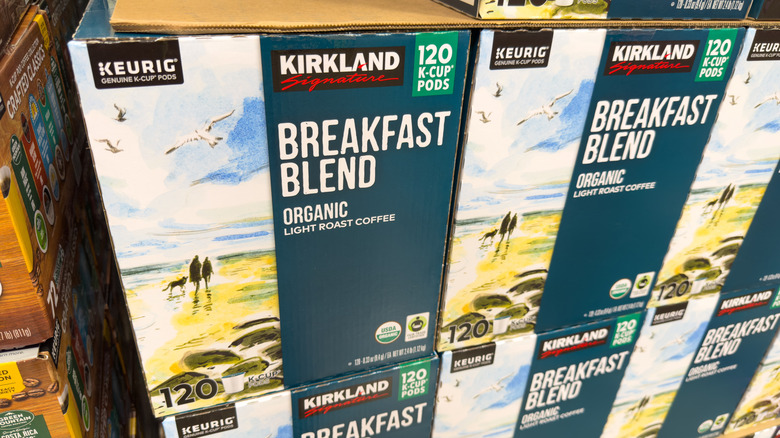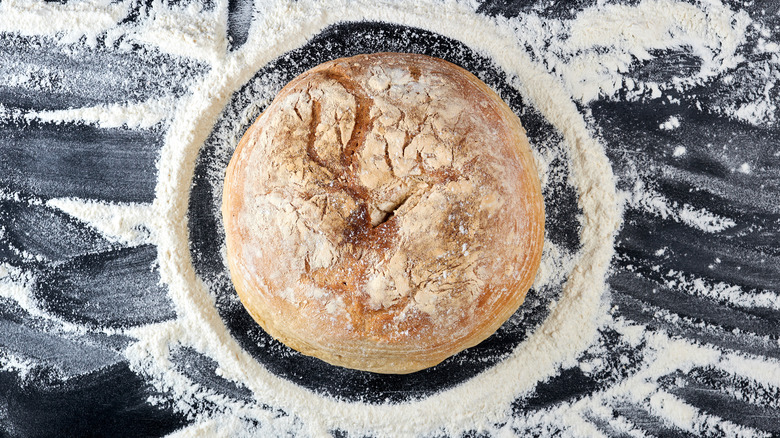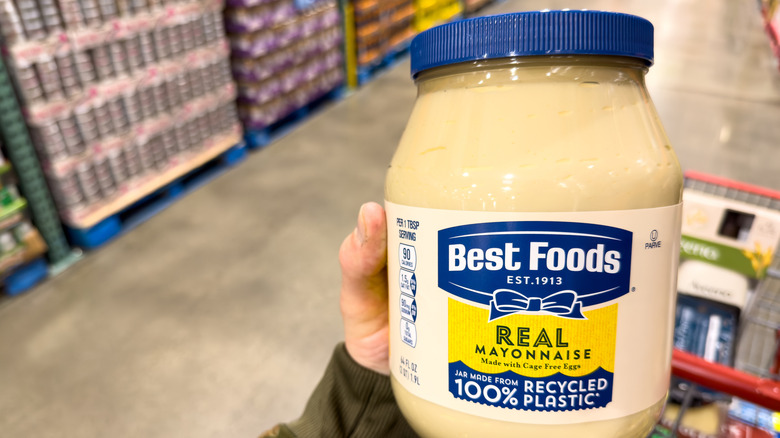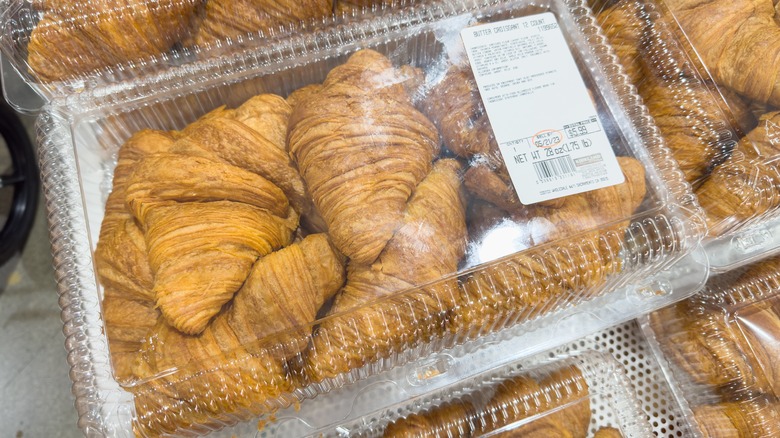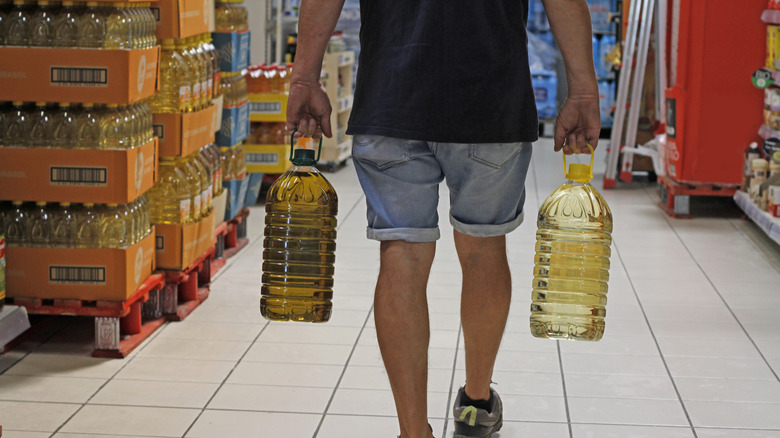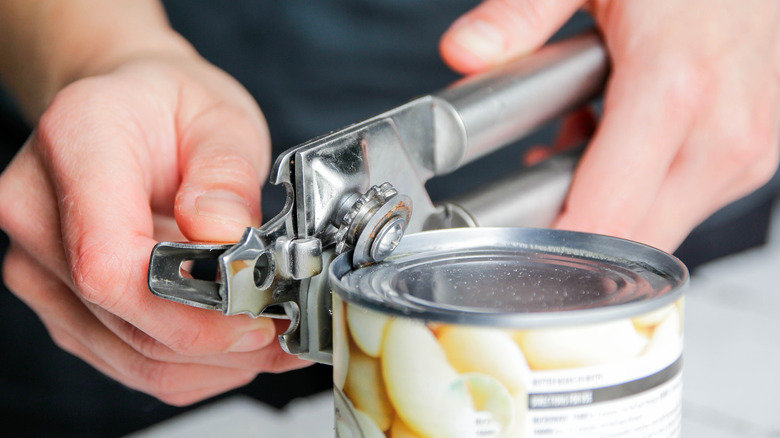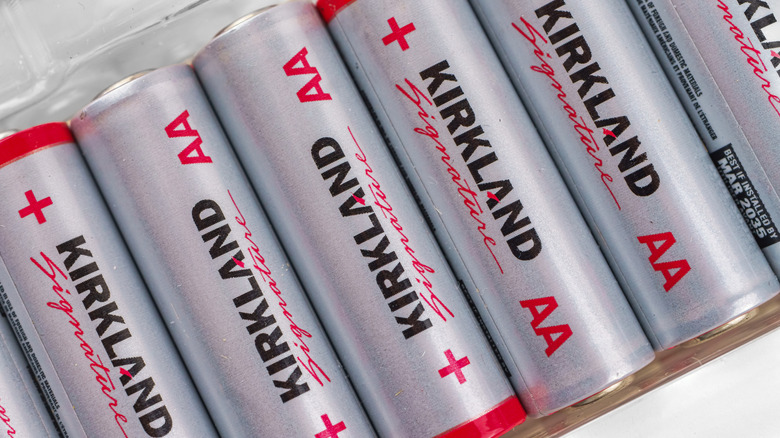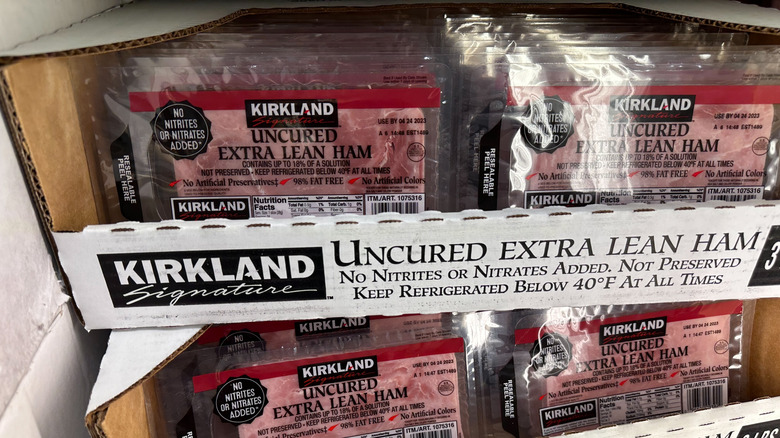Costco Grocery Products That Aren't Worth The Price
When you flash your membership card at Costco's entrance, you enter a world of bulk-priced heaven. The warehouse giant has mastered the art of bulk shopping, offering everything from applesauce pouches for your toddler to a new set of tires for your F250 at competitive prices. The grocery section, in particular, attracts shoppers seeking to reduce their monthly food spending through bulk buying.
However, experienced Costco shoppers know that only some items in those towering aisles are a genuine bargain. Sure, buying in bulk can lead to significant savings on certain items. Still, other products might cost you more in the long run through waste, spoilage, or simply because better deals exist elsewhere. The key to successful Costco shopping lies in knowing which items offer value and which ones you should skip and head to your local store to pick them up. Fear not; we are breaking down what Costco grocery items are not worth the price, so you can continue to shop smart at your favorite bulk superstore.
Fresh produce
Let's discuss that moment of pure optimism in Costco's produce section. You know the one — where you're standing there, staring at a bag of spinach big enough to feed a family of 60 rabbits, thinking, "This is it. This is the week I become a salad person!" Oh, honey. We've all been there, and we all know how this story ends.
Those produce prices are seductive, aren't they? Like that enormous bag of avocados beckoning you with dreams of daily avocado toast and homemade guacamole. But unless you are running a smoothie bar or hosting a vegan convention, let's be real about how this plays out. One day, you are admiring your savvy shopping skills, and the next, you're playing "What's That Smell?" in your crisper drawer.
The cold, hard truth about Costco produce is that Mother Nature doesn't care about your bulk-buying ambitions. Those avocados are plotting against you, conspiring to ripen all at once like they're performing a synchronized swimming routine. You'll have exactly 17 minutes between rock-hard and brown mush to catch them at peak perfection.
And let's talk about that industrial-sized bag of spinach. Sure, it looks like a great deal until it transforms into green slime two days after you bought it. For most of us mere mortals who occasionally forget about our vegetables, sticking to smaller quantities from the regular grocery store is probably smarter. Unless you are feeding your toddler who thinks berries are better than candy, save yourself from the produce preservation panic.
Spices and seasonings
While those giant containers of spices might seem like an incredible bargain, they're one of the worst values in Costco's grocery section. Most dried herbs and spices start losing their mojo after just one year. Yep, that means those ancient spices lurking in the back of your cabinet from 2017 are expensive dust at this point. Time to face the music and do a pantry purge.
However, not all hope is lost for bulk spice shoppers. Because they have an indefinite shelf life, the only spices worth buying at Costco are vanilla extract and salt. Additional spices you could buy in bulk if you're an avid cook are unground whole spices, like peppercorns, allspice, and caraway seeds; these will stay potent for about three to four years. Spices and herbs like basil, oregano, rosemary, and most seasoning blends will only stay potent for about a year, so unless you know you'll use them within that time frame, they aren't a bargain.
That massive container of oregano or garlic powder might last you several years, but by then, you'll be cooking with shadows of their former flavor. The loss of potency means you'll need to use more of the spice to achieve the same taste, negating any potential savings. Additionally, spices absorb moisture over time, leading to clumping and degradation in quality. Instead, buy smaller quantities from your regular grocery store, where you can replenish them more frequently, ensuring maximum flavor in your cooking.
Milk and dairy products
The dairy section at Costco offers large quantities at competitive prices, but milk and many dairy products have very short shelf lives. Costco's milk typically comes in 2-gallon packs with awkwardly shaped containers that can make pouring difficult and lead to spills. Even if you have a larger family, finishing 2 gallons of milk before it spoils can be challenging, especially since milk typically stays fresh for only about a week after opening. Similarly, large containers of yogurt, sour cream, and other dairy products might spoil before you can finish them. Additionally, dairy prices at regular grocery stores often compete with or beat Costco's prices, especially when on sale or with coupons.
You could always swap regular milk for lactose-free milk because it has a much longer shelf life. It's around $1 more, but you're saved from pouring expired milk down the drain. However, if you're not interested in trading Oreo's best friend for a lactose-free option, you could pick up a smaller jug at your local non-Costco grocery store.
Coffee beans and ground coffee
You would assume that buying coffee in bulk is genius if you're a daily coffee drinker, but you could be wrong (depending on your level of consumption). Kirkland's 100% Colombian Coffee is currently priced at $5.66 per pound (prices may vary based on location), while Aldi's Beaumont Classic Roast is priced at approximately $5.19 per pound. You're actually paying more for your Costco bulk grounds. In addition, coffee begins losing its freshness and flavor shortly after roasting, and ground coffee deteriorates even faster. Once opened, coffee beans can start losing their peak flavor within a few weeks, while ground coffee can become stale in one to two weeks.
While it is still safe to consume, the oxidation process after opening the package affects the aroma and taste of your morning brew. Unless you're brewing coffee for a large office or going through several cups a day, those big bags of coffee might provide a subpar coffee experience long before you reach the bottom of the container. However, if you're not a coffee snob and you're just loading your coffee with cream and sugar, you might not be bothered by a slight loss of flavor.
Flour and baking ingredients
You've seen them there, haven't you? The massive bags of flour at Costco are begging you to live out your "Great British Bake Off" fantasies. They whisper sweet promises of endless chocolate chip cookies, perfectly crusty artisan bread, and enough muffins to feed a small nation. And for a moment, you're convinced you'll actually use 25 pounds of flour before it turns into a science experiment in the back of your pantry.
But unless you're running a cookie empire, those giant bags of baking supplies might be more trouble than they're worth. That big bag of all-purpose has a shorter shelf life than you think. We're talking three to eight months maximum at room temperature before it starts getting funky — and not in a good way.
Sure, you could stash it in your freezer right next to that bag of peas from 2019. But let's be real — do you really want to sacrifice precious frozen pizza space for flour? Plus, flour is basically a sponge for every weird smell in your pantry. Nobody wants their chocolate cake to taste like last month's garlic experiment.
For occasional bakers, regular grocery store quantities are your best friend. Save the bulk buying for when you land a cooking show. Until then, stick to sizes that won't have you discovering surprise pantry pets six months later.
Condiments and sauces
Some condiments at Costco are smart buys, like the 32-ounce jar of Duke's Mayonnaise for the dedicated mayo-obsessed shopper. However, most households struggle to use these oversized jars before quality issues develop.
The primary problem with bulk condiments is that once opened, they decline in quality, even if they're still technically safe to eat. Many condiments start losing their best quality after about two months in the refrigerator. Additionally, whenever you open and close these large containers, you expose them to air and potential contamination, which can affect their quality over time. Many condiments can also separate or change texture after extended storage. That massive ketchup bottle might seem like a bargain until you realize it has been sitting in your fridge for six months, developing an unappetizing darker color or watery consistency.
Smart shoppers should also consider that regular grocery stores frequently run sales on condiments, particularly during grilling season and holidays. When you factor in these sales prices and the reduced risk of waste, purchasing smaller containers at your local supermarket often proves more economical in the long run. Save those bulk condiment purchases for times when you're planning large gatherings or know you'll go through the product quickly enough to maintain its quality.
Bread and baked goods
Costco's bakery section is legendary for its delicious offerings, but buying bread products in bulk often leads to waste. Most bakery items go stale within a few days, even when properly stored. While you can freeze bread, multiple loaves take up significant freezer space, and frozen bread never maintains the same texture as fresh. The same applies to bagels, rolls, and other baked goods. These items often come in such large quantities that you might throw away a significant portion unless you're feeding a crowd or have specific plans for using them. Additionally, many local grocery stores offer fresh bread at competitive prices, especially if you watch for sales.
Some people have found that you cannot buy one pack of muffins; you have to buy two packs at Costco, which amounts to 12 massive muffins. After two days, the muffins are stale, so unless you have plans to eat 12 large muffins in 48 hours, you're wasting money. In response, others commented that you should cut them in half and freeze them for better portioning and to reduce food waste.
Oils and vinegars
Let's talk about those monster-sized bottles of olive oil at Costco that could last you through the apocalypse. Sure, they're tempting — especially when you're channeling your inner Italian chef and dousing everything in liquid gold. We get it. That per-liter price of $13 looks amazing, and who doesn't want to cook like they've got their olive grove in Tuscany?
But here's the thing about cooking oils that most of us learn the hard way: They're surprisingly high-maintenance divas that don't age gracefully. That massive bottle of extra virgin olive oil you proudly lugged home? It starts losing its pizzazz the moment you crack the seal. Within six months, that bright, peppery kick you paid for can fade into a sad shadow of its former self. And if you've ever tasted rancid oil, you know it's an experience you don't want to repeat — think bitter, funky, and not what you want on your homemade focaccia.
Vinegars might seem more laid-back, but they've got their issues, too. While they won't go bad enough to send you running for the hills, that fancy aged balsamic can lose its complex personality over time, becoming about as interesting as plain old table vinegar. Buying oils and vinegars in regular grocery store sizes makes way more sense for most home cooks. You might pay more per ounce, but at least you'll use it while it still tastes like it should.
Canned goods
Let's chat about those towering stacks of canned goods at Costco that make you feel like you're prepping for the zombie apocalypse. You know the ones — wall upon wall of green beans, corn, and diced tomatoes that seem to whisper, "Buy me, I'll last forever!" While they're not wrong about the lasting part (hello, 2027 expiration date), your local grocery store is probably throwing better sales than Costco's "everyday low prices." We're talking about those magical moments when canned corn drops to $0.50 a can, making Costco's bulk pricing look as special as a participation trophy. The real kicker? You can cherry-pick what you need instead of committing to enough green beans to feed a small army.
And let's talk storage. Unless you're blessed with a pantry the size of a small bedroom, those cases of canned goods will take up real estate faster than a house flipper in a hot market. That space under your bed? Already stuffed with shoes. That top shelf in the garage? Too hot — unless you enjoy the exciting gamble of will-these-tomatoes-taste-weird-next-year roulette. Because yes, even canned goods can go sideways if they're stored in too warm or humid spots.
Think about it: Do you need 24 cans of chickpeas taking up space next to your water heater? Unless you're running a hummus factory or expecting the end of times, probably not.
Non Kirkland Signature items
Let's have a heart-to-heart about your shopping habits at Costco. You know that moment when you're reaching for the fancy-pants name-brand cereal, walking right past its Kirkland Signature cousin? Well, here's the tea about Kirkland Signature: It is the undercover boss of store brands. While you are paying extra for pretty packaging and familiar logos, Kirkland is serving up the same quality (and sometimes better) for a fraction of the price. And here's the plot twist that'll blow your mind: Many of these Kirkland products are made by those big-name brands you're loyal to. That Kirkland coffee you've been side-eyeing? Word on the street is it's getting cozy with Starbucks behind the scenes. And those Duracell batteries? They're going undercover in Kirkland Signature packaging.
We're talking about everything from Lululemon leggings (just speculation) to Jelly Belly jelly beans. However, some speculation has led to brands speaking out to put rumors to rest. Many vodka lovers have been outspoken online about Grey Goose's making of Costco's vodka because they taste so similar. This stirred up such a frenzy that Grey Goose released a statement that it does not produce or privately label Kirkland vodka. Still impressive, though, is that Kirkland Signature Vodka has won out many times in blind taste tests against expensive name brands despite being a sliver of the cost.
Pre-packaged deli meats
Oh, those tantalizing packages of pre-sliced turkey and ham at Costco. They look so innocent sitting there in their family-sized glory, promising weeks of perfect sandwiches. But let's get real about this meaty situation — these bulk beauties can turn into a science experiment faster than your kids can say, "Not another turkey sandwich." A Costco executive even shared that deli meat is on her list of four things she rarely buys there.
Unfortunately, that massive package of deli meat isn't going to be your lunchtime hero. Once you break that seal, you're starting a three to five day countdown clock that waits for no family. Unless you've got a gaggle of teenagers or are running a sandwich shop out of your garage, you're racing against time.
Then there's the texture trouble. You know what we're talking about — that weird slimy film that develops, making your meat look like it's trying to evolve into something else. Or those dried-out edges that could probably double as leather patches. Nothing kills sandwich enthusiasm quite like meat that's doing its best impression of a rubber mat.
Your local deli counter is the way to go. Sure, you might pay a few cents more per pound, but at least you won't be playing "Guess what's growing on the ham" by day four. Plus, you can get your meat sliced exactly as you like. Buy what you need, use what you buy, and save yourself from the great deli meat disappointment of 2024.
